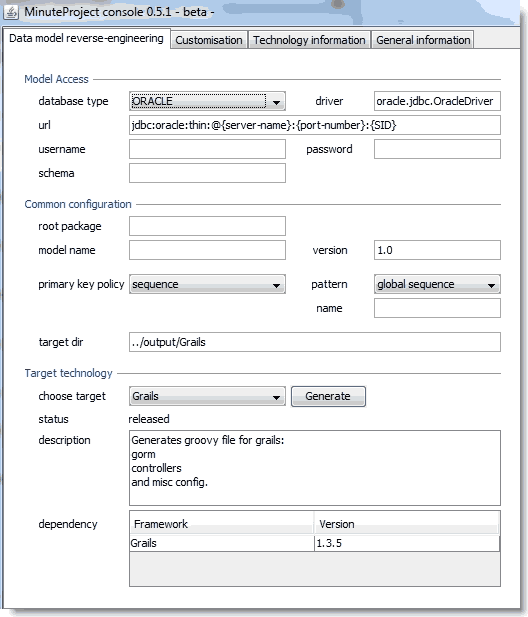MinuteProject快速生成源码
MinuteProject是一个能够一次性生成源码的反转工程(reverse-engineering) 工具,也就是代码生成器,它能够产生各种开源堆栈的应用代码,后端根据已经存在数据表产生的代码包括: Hibernate, JPA, JPA2, springframework. REST: JEE-jersey, CXF, springMVC.等等;前端代码包括Openxava, Grails, Play. Methodology: FitNesse.还有: vaadin, jsf-primefaces, jooq, rails等
首先,下载MinuteProject,有命令和GUI两种方式启动:
1. 在解压后的项目/bin/start-console.cmd 或start-console.sh 启动GUI,如下图:

你可以选择你使用的数据库,目前支持下面几种:Oracle; DB2; Mysql; hsqldb; derby。
填写好数据库连接,比如mysql是:jdbc:mysql://127.0.0.1:3306/test,其中 test是你建立的数据库名称,输入用户名和密码,schema是已经存在的一个数据表,MinuteProject将根据这个表结构产生相应的模型和DAO代码。
roo package是指你的代码的包名,比如com.jdon,模型名称是你的业务模型名称,比如Order或Product等等。
下面可以选择target类型,也就是你需要生成代码的类型,有如下:
- Maven Spring Hibernate (advanced DAO)
- Maven Spring JPA/Hibernate (advanced DAO)
- FitNesse
- Spring/Hibernate (standard)
- Spring/JPA/Hibernate (standard)
- Spring/iBatis (standard)
- OpenXava
- Grails
- Play
- JPA2
- JSF-primefaces
- REST-JEE
- WS-JEE
选择产生的代码类型后,点按generate,在项目目录output下生成了代码,如果你没有发现这个目录,主要可能是你的数据库参数没有配置正确。
2.命令行生成代码方式
在项目的/mywork/config目录下有一个样本配置文件:mp-config-sample.xml,根据你安装的数据库配置这个配置文件,存成另外一个文件如Hello.xml,里面的mysql配置如下:
<!DOCTYPE root>
<generator-config xmlns="http://minuteproject.sf.net/xsd/mp-config"
xmlns:xs="http://www.w3.org/2001/XMLSchema-instance"
xs:noNamespaceSchemaLocation="mp-config.xsd">
<configuration>
<model name="Hello" version="1.0" package-root="com.jdon.demo">
<data-model>
<driver name="mysql" version="5.0.5" groupId="mysql" artifactId="mysql-connector-java"></driver>
<dataSource>
<driverClassName>org.gjt.mm.mysql.Driver</driverClassName>
<url>jdbc:mysql://localhost:3306/test</url>
<username>banq</username>
<password>xxxx</password>
</dataSource>
<!-- autoincrement primary key -->
<primaryKeyPolicy>
<primaryKeyPolicyPattern name="autoincrementPattern" ></primaryKeyPolicyPattern>
</primaryKeyPolicy>
</data-model>
<business-model>
<generation-condition>
<condition type="exclude" startsWith="SYS_ADMIN"></condition>
</generation-condition>
<business-package default="model">
<condition type="package" startsWith="TB_" result="other"></condition>
</business-package>
<!-- Enrichment gives extra information that can be used by the template
Ex: one concept such as indicating that an entity contains master data can trigger specific artifact generation on multiple level:
- specific DAO,
- cache configuration,
- presentation navigation behaviour (access to the entity via drop down list and not classical affection Sub Use Case)
- enumeration (strong typing) in some cases
- sql constraint statement in some cases
Enrichment can target entities, fields, business package
-->
<enrichment>
<!-- content-type enrichment -->
<entity name="CATEGORY" content-type="reference-data" >
<!-- TODO semantic reference -->
</entity>
<!-- constraining a field -->
</enrichment>
</business-model>
</model>
<!-- change your catalog entry with one of the track -->
<targets catalog-entry="JOOQ"/>
</configuration>
</generator-config>
其中targets catalog-entry="JOOQ"是选择你生成代码的架构类型,这里是JOOQ。
在此目录下运行:
model-generation.cmd Hello.xml
那么在与当前config平行的目录/mywork/output下产生了代码。
例如testuser表产生的DAO接口TestuserDao代码如下:
public interface TestuserDao {
/**
* Inserts a Testuser entity
* @param Testuser testuser
*/
public void insertTestuser(Testuser testuser) ;
/**
* Inserts a list of Testuser entity
* @param List<Testuser> testusers
*/
public void insertTestusers(List<Testuser> testusers) ;
/**
* Updates a Testuser entity
* @param Testuser testuser
*/
public Testuser updateTestuser(Testuser testuser) ;
/**
* Updates a Testuser entity with only the attributes set into Testuser.
* The primary keys are to be set for this method to operate.
* This is a performance friendly feature, which remove the udibiquous full load and full update when an
* update is to be done
* Remark: The primary keys cannot be update by this methods, nor are the attributes that must be set to null.
* @param Testuser testuser
*/
public int updateNotNullOnlyTestuser(Testuser testuser) ;
public int updateNotNullOnlyPrototypeTestuser(Testuser testuser, Testuser prototypeCriteria);
/**
* Saves a Testuser entity
* @param Testuser testuser
*/
public void saveTestuser(Testuser testuser);
/**
* Deletes a Testuser entity
* @param Testuser testuser
*/
public void deleteTestuser(Testuser testuser) ;
/**
* Loads the Testuser entity which is related to an instance of
* Testuser
* @param Long id
* @return Testuser The Testuser entity
public Testuser loadTestuser(Long id);
*/
/**
* Loads the Testuser entity which is related to an instance of
* Testuser
* @param java.lang.String Userid
* @return Testuser The Testuser entity
*/
public Testuser loadTestuser(java.lang.String userid);
/**
* Loads a list of Testuser entity
* @param List<java.lang.String> userids
* @return List<Testuser> The Testuser entity
*/
public List<Testuser> loadTestuserListByTestuser (List<Testuser> testusers);
/**
* Loads a list of Testuser entity
* @param List<java.lang.String> userids
* @return List<Testuser> The Testuser entity
*/
public List<Testuser> loadTestuserListByUserid(List<java.lang.String> userids);
/**
* Loads the Testuser entity which is related to an instance of
* Testuser and its dependent one to many objects
* @param Long id
* @return Testuser The Testuser entity
*/
public Testuser loadFullFirstLevelTestuser(java.lang.String userid);
/**
* Loads the Testuser entity which is related to an instance of
* Testuser
* @param Testuser testuser
* @return Testuser The Testuser entity
*/
public Testuser loadFullFirstLevelTestuser(Testuser testuser);
/**
* Loads the Testuser entity which is related to an instance of
* Testuser and its dependent objects one to many
* @param Long id
* @return Testuser The Testuser entity
*/
public Testuser loadFullTestuser(Long id) ;
/**
* Searches a list of Testuser entity based on a Testuser containing Testuser matching criteria on the positive mask
* @param Testuser testuser
* @return List<Testuser>
*/
public List<Testuser> searchPrototypeTestuser(Testuser testuser) ;
/**
* Searches a list of Testuser entity based on a Testuser containing Testuser matching criteria on any field
* @param Testuser testuser
* @return List<Testuser>
*/
public List<Testuser> searchPrototypeAnyTestuser(Testuser testuser) ;
public List<Testuser> find (Testuser testuser, EntityMatchType matchType, OperandType operandType, Boolean caseSensitivenessType) ;
/**
* Searches a list of Testuser entity based on a list of Testuser containing Testuser matching criteria
* @param List<Testuser> testusers
* @return List<Testuser>
*/
public List<Testuser> searchPrototypeTestuser(List<Testuser> testusers) ;
/**
* Searches a list of Testuser entity
* @param Testuser testuser
* @return List
*/
public List<Testuser> searchPrototypeTestuser(Testuser testuserPositive, Testuser testuserNegative) ;
}